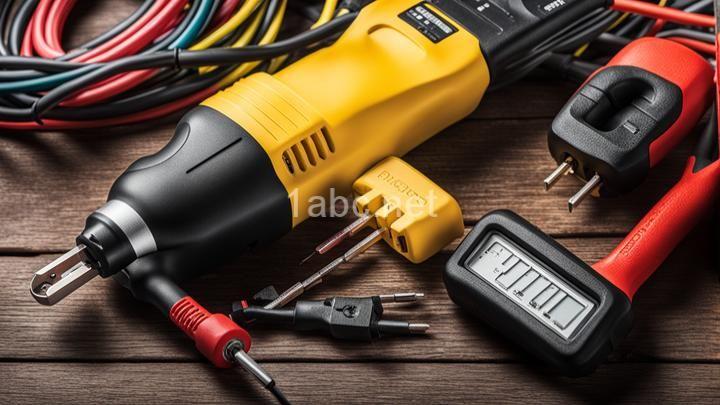The Ultimate Guide to Buying Electrical Tools for Home Maintenance

Introduction:
Welcome readers to the ultimate guide on buying electrical tools for home maintenance. We understand that electrical work can sometimes be daunting, but with the right tools and a little know-how, you can tackle any project with confidence. In this guide, we will walk you through everything you need to know about buying electrical tools, from understanding your needs to finding reputable sellers. So, let's dive in and equip you with the knowledge to become a DIY electrical pro!
Section 1: Understanding Your Needs
Before diving into the world of electrical tools, it's crucial to assess your specific needs. As a homeowner, you're likely to encounter common electrical tasks such as replacing light fixtures, installing outlets, or troubleshooting faulty circuits. By understanding these tasks, you can determine the essential tools required for the job.
For example, if you're replacing a light fixture, you'll need a screwdriver, wire stripper, and voltage tester. On the other hand, installing outlets requires additional tools like a wire cutter and fish tape. By assessing your needs beforehand, you can avoid purchasing unnecessary tools and save both time and money.
Section 2: Essential Electrical Tools
Now that you have a better understanding of your needs, let's discuss the essential electrical tools every homeowner should have in their toolbox. These tools will come in handy for a wide range of electrical projects around your home.
-
Screwdriver: A versatile tool that allows you to tighten or loosen screws. Look for a set with different tip sizes and magnetic tips for convenience.
-
Wire Stripper: Essential for removing the insulation from electrical wires. Opt for one with adjustable cutting jaws to accommodate different wire sizes.
-
Voltage Tester: A must-have for testing whether an electrical circuit is live or not. Choose a non-contact voltage tester for added safety.
-
Pliers: These come in handy for bending, cutting, or gripping wires. Look for a pair with insulated handles for added protection.
-
Wire Cutter: Used for cutting electrical wires cleanly and precisely. Choose a durable wire cutter with a comfortable grip.
-
Fish Tape: Ideal for pulling wires through walls, ceilings, or conduit. Look for a flexible and non-conductive fish tape for easier maneuverability.
When purchasing these tools, consider factors like quality, brand reputation, and user reviews. Investing in reliable tools will not only ensure the safety of your electrical work but also save you from constant replacements.
Section 3: Specialized Electrical Tools
While the essential tools cover the basics, some electrical projects may require specialized tools. These tools are typically needed for more advanced electrical work or specific tasks.
-
Multimeter: A versatile tool used to measure voltage, current, and resistance. It's essential for troubleshooting electrical issues and testing circuits.
-
Circuit Breaker Finder: This tool helps you locate specific circuit breakers in your electrical panel. It's particularly useful when dealing with complex electrical systems.
-
Wire Crimper: Used to create secure connections between wires and terminals. Look for a crimper with a variety of die sizes to accommodate different wire gauges.
-
Conduit Bender: If you're working with conduit installations, a conduit bender is necessary for shaping and bending the conduit to the desired angles.
-
Cable Puller: Designed to pull heavy cables through long distances or tight spaces. Choose a cable puller with a sturdy construction and a high pulling capacity.
When using specialized tools, it's crucial to follow safety precautions and, if necessary, obtain any required certifications. Electrical work can be hazardous, so always prioritize safety.
Section 4: Considerations When Buying Electrical Tools
Before making any purchase, there are a few factors to consider to ensure you're getting the best value for your money.
-
Budget: Determine a reasonable budget for your electrical tools. While it's tempting to opt for the cheapest options, remember that quality tools are more durable and offer better performance in the long run.
-
Quality: Invest in high-quality tools that will withstand frequent use and maintain their functionality. Look for reputable brands known for their reliability.
-
Durability: Consider the durability of the tools, especially if you plan on using them frequently. Pay attention to the materials used and read customer reviews for insights on their longevity.
-
Brand Reputation: Research different brands and their reputation within the electrical tools market. Opting for well-established brands often ensures better customer support and reliable warranties.
-
Reviews and Comparisons: Read customer reviews and compare prices across different sellers to make an informed decision. Online platforms like Amazon provide valuable insights from real users.
By considering these factors before purchasing, you can make a well-informed decision and avoid any regrets down the line.
Section 5: Safety Measures
When it comes to electrical work, safety should always be your top priority. Here are some essential safety measures to follow at all times:
-
Turn off the power: Before starting any electrical work, always turn off the power to the circuit you're working on. This will prevent any accidental shocks or short circuits.
-
Use safety gear: Invest in safety gear like insulated gloves, safety goggles, and a fire extinguisher. Protecting yourself from potential hazards is crucial.
-
Proper grounding: Ensure that your electrical system is properly grounded to minimize the risk of electrical shocks.
-
Avoid overloading circuits: Distribute electrical loads evenly across circuits to prevent overheating and potential fires.
-
Educate yourself: Take the time to educate yourself on electrical safety practices and techniques. Understanding the risks involved will help you take the necessary precautions.
Section 6: Where to Buy Electrical Tools
Now that you're equipped with the knowledge of what tools you need and what to consider before purchasing, it's time to find a reliable seller. Here are a few options to consider:
-
Local hardware stores: Visit your local hardware stores to physically examine the tools and seek advice from knowledgeable staff.
-
Online retailers: Online platforms like Amazon, Home Depot, and Lowe's offer a wide range of electrical tools. Read product descriptions, customer reviews, and compare prices to make an informed decision.
-
Specialty electrical stores: Consider visiting specialty electrical stores that cater specifically to electrical professionals. These stores often carry a wide range of tools and can provide expert advice.
Conclusion:
In conclusion, having the right electrical tools is essential for any homeowner looking to tackle electrical projects with confidence. By understanding your needs, investing in essential and specialized tools, considering important factors before purchasing, prioritizing safety, and finding reputable sellers, you'll be well-prepared to take on any electrical task that comes your way.
Remember, electrical work can be complex and potentially dangerous, so always prioritize safety and, if a project exceeds your skill level, don't hesitate to call a professional electrician. Happy shopping and best of luck with your home maintenance endeavors!
FREQUENTLY ASKED QUESTIONS
What is The Ultimate Guide to Buying Electrical Tools for Home Maintenance?
The Ultimate Guide to Buying Electrical Tools for Home Maintenance is a comprehensive resource that provides valuable information on selecting the right tools for your electrical needs. Whether you are a DIY enthusiast or a homeowner looking to tackle basic electrical repairs, this guide has got you covered.When it comes to buying electrical tools, it is essential to prioritize safety and quality. The guide emphasizes the importance of investing in tools from reputable brands that meet industry standards. It provides detailed explanations of different types of tools, such as wire strippers, pliers, voltage testers, and circuit breakers, and highlights the features to consider when making a purchase.
To assist you in making informed decisions, the guide also includes tips on evaluating tool specifications, understanding electrical ratings, and deciphering product labels. It emphasizes the significance of selecting tools that are appropriate for the specific tasks you will be undertaking.
Furthermore, the guide offers insights into where to purchase electrical tools, whether it be local hardware stores, online retailers, or specialized electrical supply shops. It provides suggestions on comparing prices, reading customer reviews, and seeking recommendations from professionals.
With a balanced blend of factual information and practical advice, The Ultimate Guide to Buying Electrical Tools for Home Maintenance equips you with the knowledge and guidance necessary to confidently navigate the world of electrical tool purchasing. It empowers you to make smart choices that align with your needs, budget, and safety requirements.
So, whether you are a seasoned handyman or a newbie in the realm of electrical repairs, this guide will serve as your go-to resource, ensuring that you have the right tools at your disposal for any home maintenance project. Get ready to tackle electrical tasks with confidence and achieve professional-level results.
Why is it important to have the right electrical tools for home maintenance?
Having the right electrical tools for home maintenance is important for several reasons. Firstly, using the correct tools ensures your safety and the safety of others. Electrical work can be dangerous, and using improper tools can increase the risk of accidents, such as electrocution or fires.Secondly, the right tools make the job easier and more efficient. When you have the appropriate tools, you can work more effectively, saving time and effort. This is particularly important for home maintenance tasks, as you may need to complete multiple projects or repairs.
Additionally, using the right electrical tools helps prevent damage to your electrical systems. Using the wrong tools can lead to damaged wires, connectors, or other components, which can cause malfunctions or even permanent damage to your electrical system. By using the correct tools, you minimize the risk of causing unnecessary repairs or replacements.
Lastly, having the right electrical tools allows you to perform a wider range of maintenance tasks. Different electrical projects require specific tools, and if you don't have the appropriate tools, you may be limited in what you can accomplish. By investing in the right tools, you can confidently tackle various electrical tasks, from basic repairs to more complex installations.
In conclusion, having the right electrical tools for home maintenance is crucial for safety, efficiency, preventing damage, and expanding your capabilities. It is worth investing in quality tools that are specifically designed for electrical work to ensure successful and safe completion of your home maintenance projects.
What topics are covered in this guide?
In this guide, we cover a range of topics that are designed to help you navigate various aspects of the subject. Some of the key topics we delve into include [insert topics here]. Whether you are a beginner or have some prior knowledge, this guide aims to provide you with valuable insights and practical tips to enhance your understanding and skills in [subject]. So, get ready to explore topics such as [topic 1], [topic 2], [topic 3], and more!
Are there any specific brands or models recommended in the guide?
In the guide, there are several specific brands and models recommended that you might find helpful. These recommendations are based on their performance, reliability, and customer satisfaction. However, it's important to note that everyone's needs and preferences may vary, so what works for one person may not work for another. It's always a good idea to do some research and read reviews to find the best fit for you.



